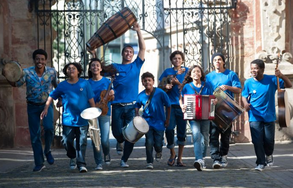At a time of great uncertainty this blog is about our web name BCre8ive.eu.
Initially chosen because someone had parked on bcre8ive.com on the very day we were searching for domain names and was demanding money for us to use it. Commercial blackmail is acceptable in certain circles but it is not something we countenance or give in to. So we went in search of another domain, and .eu was available.
As freelancers, the founders of BCre8ive have worked, and still work, with individuals companies and organisations across the world, but predominantly in Europe. In this context .eu meant something about the reality of our working world, and the wider context in which we thought BCre8ive would, and does, operate.
Projects submitted to our first Labs included the true story of a Mongolian woman, living in Scotland, who forced the UN to remove the term of reference ‘Mongol’ from the list of words deemed acceptable when describing people with Downs Syndrome. Other projects came from all over the UK, with partners in France, USA, and Belgium.
In July, Phil, co-founder of BCre8ive, will chair a session a the Children’s Media Conference, on the ‘Green Shoots’ for UK children’s film. Part of the panel in this discussion will be Ansgar Ahlers, a young German film maker, talking about his first feature film ‘Bach in Brazil’. This story about a failed elderly music teacher, who is fated to end up teaching in a children’s prison in Brazil and bring these children to perform successfully in Germany, started out as a conversation in a coffee bar in Berlin. It took Ansgar and Phil eight years to reach completion and see the finished film still running in German cinemas after 16 weeks, out performing other major independent films.
We live and work as creatives in an international and collaborative world, where this type of project is possible, and essential to global understanding.
On Thursday 23rd June 2016, Phil attended the European Creative Industries Summit in Brussels. At this session Martine Reicherts, Director General for Education and Culture at the European Commission (EC) committed the organisation to breaking down the ‘silo’ mentality of the old arts, media, and games worlds. At the same session Christian Ehler, leader of the Creative Industries group within the European Parliament announced that a cross sector policy, by which creatives industries will become part of all relevant EC funding and policy decisions for the future of Europe, had been adopted.
The UK referendum vote potentially removes us from this ongoing development of the Creative Industries in Europe.
A vote which the UK Creative Industries as a whole rejected in a pre-referendum survey by the Creative Industries Federation.
- 96% support for Remain amongst Federation members, with barely 4% in favour of Leave.
- 84% of members said EU membership was important to the future of their organisation, with just 1.5% saying it was irrelevant
We are an online community. The only borders we have to creativity are ones people have imposed on them. Our partnerships are global. Our audiences are global.
However, we are a collection of small and micro businesses, vulnerable to uncertainty, in need of structural, training, research, and financial support to flourish and grow in the face of major global multinationals not based in the UK, or Europe.
The EC is a focus for this support, and critical to the international legal framework which can protect freelancers and small businesses from the forces of monopolies and cartels which distort our market, and aim to diminish the income of talent, and the growth of new creative enterprises.
For all these reasons we remain .eu.



